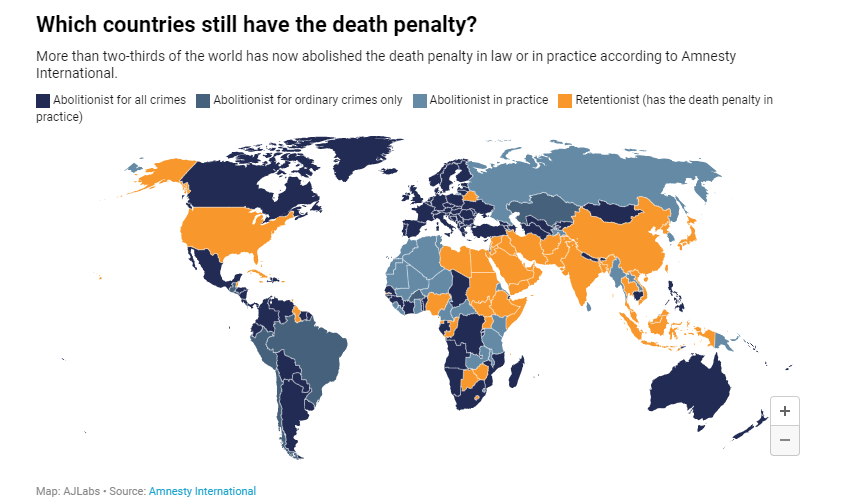Practice of the Death Penalty Around the World
United States is only western industrialized country still using the practice

More than two-thirds of the world’s countries have abolished the death penalty in law or practice. By the end of 2021, 108 countries had abolished the death penalty for all crimes, eight countries had abolished the death penalty for crimes not committed during times of war, and 28 countries still retained the death penalty but had not executed anyone over the past 10 years.
As in previous years, the execution total does not include the estimated thousands of executions carried out in China, which treats data on the death penalty as a state secret. Excluding China, 88% of all reported executions took place in just four countries — Iran (246+), Egypt (107+), Iraq (45+), and Saudi Arabia (27) — which had combined for 86% of reported executions in 2019. The 17 executions in the U.S. were the sixth most recorded in any nation, although Vietnam’s and North Korea’s execution totals are not known and were likely higher.
It's eye-opening that the United States is included in that group of countries; totalitarian states low on the democracy index.
The death penalty violates the constitutional guarantee of equal protection. It is applied randomly – and discriminatorily. It is imposed disproportionately upon those whose victims are white, offenders who are people of color, and on those who are poor and uneducated and concentrated in certain geographic regions of the country.
The death penalty is not a viable form of crime control. When police chiefs were asked to rank the factors that, in their judgment, reduce the rate of violent crime, they mentioned curbing drug use and putting more officers on the street, longer sentences and gun control. They ranked the death penalty as least effective. Politicians who preach the desirability of executions as a method of crime control deceive the public and mask their own failure to identify and confront the true causes of crime.
Capital punishment wastes limited resources. It squanders the time and energy of courts, prosecuting attorneys, defense counsel, juries, and courtroom and law enforcement personnel. It unduly burdens the criminal justice system, and it is thus counterproductive as an instrument for society's control of violent crime. Limited funds that could be used to prevent and solve crime (and provide education and jobs) are spent on capital punishment.
Capital punishment is an intolerable denial of civil liberties and is inconsistent with the fundamental values of our democratic system. The death penalty is uncivilized in theory and unfair and inequitable in practice, and should have no place in a modern, democratic society that the United States claims to represent.
You can visit Amnesty International's Death Penalty Abolition Information and Resource page.










